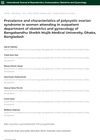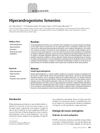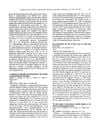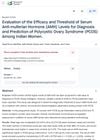 45 citations,
February 2019 in “Journal of Affective Disorders”
45 citations,
February 2019 in “Journal of Affective Disorders” Melatonin improved mental health and metabolism in women with PCOS.
 38 citations,
June 2004 in “Human Reproduction”
38 citations,
June 2004 in “Human Reproduction” The document suggests that clinical trials for PCOS should focus on meaningful primary outcomes like live birth rates, rather than less reliable surrogate markers.
 30 citations,
January 2019 in “Clinical Endocrinology”
30 citations,
January 2019 in “Clinical Endocrinology” The study concluded that both anti-Mullerian hormone and LH/FSH ratio are higher in women with PCOS and combining these markers with BMI could improve diagnosis accuracy.
 10 citations,
January 2014 in “Endocrinology & metabolic syndrome”
10 citations,
January 2014 in “Endocrinology & metabolic syndrome” PCOS is a long-term condition that needs more research for better understanding and treatment.
 4 citations,
August 2020 in “Journal of Cosmetic Dermatology”
4 citations,
August 2020 in “Journal of Cosmetic Dermatology” QR 678 and QR678 Neo treatments are effective for hair loss in women with PCOS.
 1 citations,
January 2022
1 citations,
January 2022 Myo-inositol and D-chiro-inositol improve hormonal and physical symptoms in teenage girls with PCOS.
 1 citations,
October 2013 in “Journal of Postgraduate Medical Institute”
1 citations,
October 2013 in “Journal of Postgraduate Medical Institute” Metformin helps improve menstrual irregularities and some hormone levels in PCOS patients, but not symptoms like excess hair, acne, or hair loss.
January 2020 in “Proyecto de investigación:” Longer anogenital distance may indicate a higher chance of having polycystic ovary syndrome, and measuring this distance along with hormone levels could improve diagnosis.
26 citations,
August 2008 in “Clinical endocrinology” The document concludes that more multidisciplinary research is needed to understand and treat PCOS, a condition that significantly affects women's health and quality of life.
951 citations,
December 2013 in “Clinical epidemiology” PCOS is a common hormonal disorder in women that can be managed with lifestyle changes and various medications.
 2 citations,
August 2022 in “Reproductive Biology and Endocrinology”
2 citations,
August 2022 in “Reproductive Biology and Endocrinology” Magnesium supplements improved quality of life for women with polycystic ovary syndrome, but didn't help with acne, hair loss, or abnormal bleeding.
November 2020 in “AACE clinical case reports” A woman's severe male hormone excess was caused by a small, hard-to-find ovarian tumor.
 November 2023 in “L'Endocrinologo”
November 2023 in “L'Endocrinologo” Women with PCOS are more likely to experience sexual dysfunction, but lifestyle changes and weight loss can improve sexual function.
 1 citations,
February 2021 in “International journal of reproduction, contraception, obstetrics and gynecology”
1 citations,
February 2021 in “International journal of reproduction, contraception, obstetrics and gynecology” Polycystic Ovary Syndrome (PCOS) is common in infertile women and obese women with PCOS have more severe ovulatory problems, needing more care.
 10 citations,
March 2016 in “The Journal of Obstetrics and Gynecology of India”
10 citations,
March 2016 in “The Journal of Obstetrics and Gynecology of India” The article suggests renaming Polycystic Ovarian Syndrome (PCOS) to "Hyperandrogenic Persistent Ovulatory Dysfunction Syndrome" (HA-PODS) for accuracy and consistency, but no final decision was made.
 1744 citations,
August 2006 in “The Journal of Clinical Endocrinology and Metabolism”
1744 citations,
August 2006 in “The Journal of Clinical Endocrinology and Metabolism” Polycystic Ovary Syndrome should be seen mainly as a condition of excess male hormones, with a focus on this in its definition.
 62 citations,
April 2016 in “Best Practice & Research in Clinical Obstetrics & Gynaecology”
62 citations,
April 2016 in “Best Practice & Research in Clinical Obstetrics & Gynaecology” The conclusion is that there's a need for a new conference to establish stricter guidelines for diagnosing Polycystic Ovary Syndrome (PCOS).
 20 citations,
January 1999 in “Current Pharmaceutical Design”
20 citations,
January 1999 in “Current Pharmaceutical Design” Antiandrogen therapy is effective and well tolerated for treating women's androgenic disorders like hirsutism, acne, and hair loss.
 2 citations,
April 2021 in “Reproductive health of woman”
2 citations,
April 2021 in “Reproductive health of woman” Most women with polycystic ovary syndrome (PCOS) have menstrual issues, infertility, acne, and excessive body hair, with the most common type being the non-androgenic phenotype.
 December 2022 in “BioScientific review”
December 2022 in “BioScientific review” PCOS is a hormonal disorder in women that can cause infertility and increases the risk of heart and metabolic issues.
 October 2020 in “Medicine - Programa De Formación Médica Continuada Acreditado”
October 2020 in “Medicine - Programa De Formación Médica Continuada Acreditado” Female hyperandrogenism is a condition caused by too much male hormones, leading to skin issues and ovulation problems, often due to Polycystic Ovary Syndrome, and is treated based on individual symptoms.
 January 2015 in “Springer eBooks”
January 2015 in “Springer eBooks” The document concludes that managing PCOS involves lifestyle changes, medication, and monitoring for associated health risks.

The document concludes that accurate diagnosis and management of PCOS are crucial due to its associated health risks.
 June 1995 in “International Journal of Gynecology & Obstetrics”
June 1995 in “International Journal of Gynecology & Obstetrics” Cabergoline is more effective and has fewer side effects than bromocriptine for treating women with hyperprolactinemic amenorrhea.
January 2023 in “European journal of biology and medical science research” PCOS symptoms can be managed with medication and lifestyle changes.
 155 citations,
March 2006 in “The American Journal of Medicine”
155 citations,
March 2006 in “The American Journal of Medicine” Women with PCOS have heart-related issues not because of obesity, but due to insulin resistance and low adiponectin levels.
 29 citations,
March 2010 in “Journal of Endocrinological Investigation”
29 citations,
March 2010 in “Journal of Endocrinological Investigation” Lipocalin-2 levels are higher in women with PCOS and may indicate insulin resistance.
 6 citations,
July 2013 in “Acta Clinica Belgica”
6 citations,
July 2013 in “Acta Clinica Belgica” The document concludes that combination therapy is most effective for treating excessive hair growth in women with idiopathic hirsutism, and more research is needed to understand the condition.
 January 2022 in “Research Square (Research Square)”
January 2022 in “Research Square (Research Square)” Serum AMH levels are a strong marker for diagnosing PCOS in Indian women.
 June 1995 in “International Journal of Gynecology & Obstetrics”
June 1995 in “International Journal of Gynecology & Obstetrics” Women with hair loss have higher androgen levels, while men with early balding have altered androgen ratios.
























